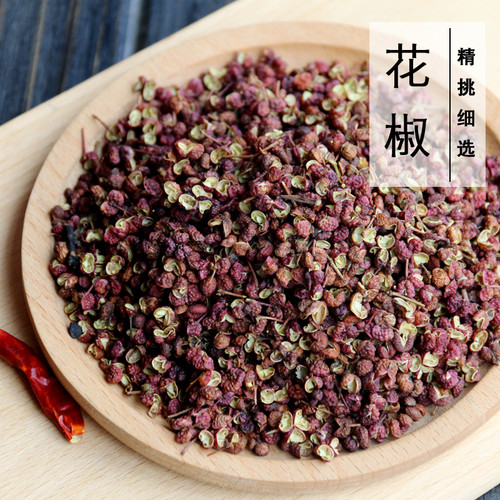Product Overview
Parts used: Dried pericarp of ripe fruit
TCM category: Herbs that warm the Interior and/or expel Cold
TCM nature: Warm
TCM taste(s): Pungent
Meridian affinity: Spleen Stomach Kidney
Scientific name: Zanthoxylum schinifolium or Zanthoxylum bungeanum
Other names: Huā jiāo, Mastic-leaf prickly ash, Chinese pepper, Chinese prickly ash, Flatspine prickly-ash
Use of sichuan pepper (Hua Jiao) in TCM
Please note that you should never self-prescribe TCM ingredients. A TCM ingredient is almost never eaten on its own but as part of a formula containing several ingredients that act together. Please consult a professional TCM practitionner, they will be best able to guide you.
Preparation: Remove the seeds and stems to keep only the pericarp (husk). Dry it.
Dosage: 3 to 6g
Main actions according to TCM*: Warms the body core, relieves pain, kills parasites and relieves itching
Primary conditions or symptoms for which sichuan pepper may be prescribed by TCM doctors*: Abdominal pain Vomiting Diarrhea Intestinal parasites Ascariasis Itching Eczema
Common TCM formulas in which sichuan pepper are used*:
For Diarrhea due to Damp-Cold combine sichuan pepper with atractylodes rhizomes (Bai Shu), tangerine peel (Chen Pi) and costus roots (Mu Xiang).
For abdominal pain and nausea due to tapeworms, especially with Cold deficiency combine sichuan pepper with chinese plums (Wu Mei) and goldthread rhizomes (Huang Lian).
Key TCM concepts behind sichuan pepper (Hua Jiao)'s properties
In Traditional Chinese Medicine (TCM), sichuan pepper are plants that belong to the 'Herbs that warm the Interior and/or expel Cold' category. Herbs in this category are used for Internal Coldness with Qi and Yang Deficiency. In the Yin and Yang system of thought (see our explanation on Yin and Yang) Yang is Hot in nature. A deficiency of Yang will therefore lead to Internal Coldness since there will as a result be more Yin (Cold in nature) than Yang. In extreme cases this can lead to so-called 'Yang collapse' with convulsions or coma and these herbs are particularly indicated to treat such scenarios.
As suggested by its category sichuan pepper are plants that are Warm in nature. This means that sichuan pepper tend to help people who have too much "cold" in their body, although with less effect than a plant that would be Hot in nature. Balance between Yin and Yang is a key health concept in TCM. Those who have too much cold in their body are said to either have a Yin excess (because Yin is Cold in nature) or a Yang deficiency (Yang is Hot in Nature). Depending on your condition sichuan pepper can help restore a harmonious balance between Yin and Yang.
Sichuan pepper also taste Pungent. The so-called "five elements" theory in Chinese Medicine states that the taste of TCM ingredients is a key determinant of their action in the body. Pungent ingredients like sichuan pepper tend to promote the circulations of Qi and body fluids. That's why for instance someone tends to sweat a lot when they eat spicy/pungent food.
The tastes of ingredients in TCM also determine what organs and meridians they target. As such sichuan pepper are thought to target the Spleen, the Stomach and the Kidney. In TCM the Spleen assists with digestion, blood coagulation and fluid metabolism in the body. The Stomach on the other hand is responsible for receiving and ripening ingested food and fluids. It is also tasked with descending the digested elements downwards to the Small Intestine. The Kidneys do not only regulate the urinary system but also play a key role in the reproductive system and the growth and aging process of the body.
Use of sichuan pepper (Hua Jiao) as food
Sichuan pepper are also eaten as food. It is used as an ingredient in dishes such as Dan Dan Noodles or Gong bao chicken.









